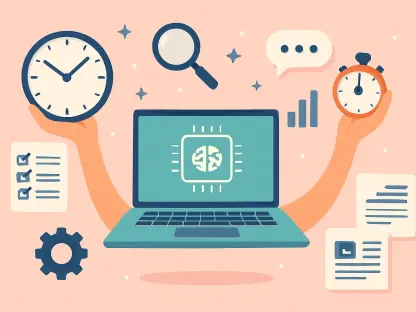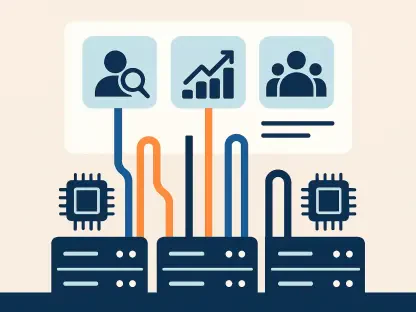The landscape of Human Resources (HR) is undergoing a seismic shift, with Artificial Intelligence (AI) playing a central role in this transformation. AI’s integration into HR practices is no longer just a futuristic concept; it’s a present reality driving new efficiencies and capabilities within organizations. As technology becomes increasingly embedded in HR functions, leaders across industries face the dual challenge of managing this integration effectively while leveraging it to maximize their strategic advantage. This digital evolution demands HR departments to not only adapt but also spearhead innovation in workforce management, recruitment, and employee engagement.
Navigating Pressure and Opportunity in AI Implementation
The Role of AI in Shaping Strategic HR Functions
The imperative for HR leaders to harness AI technologies has grown more urgent as competitive pressures mount. Chief Human Resources Officers (CHROs) are under the spotlight, tasked with demonstrating the tangible benefits of AI investments. Organizations are no longer viewing HR simply as a support function but rather as a strategic partner integral to business success. AI offers HR professionals the tools to transition from administrative roles to strategic roles, enhancing decision-making through data-driven insights. This transition is creating new opportunities for HR to significantly influence organizational growth and competitiveness.
Moving from Experimentation to Impactful AI Integration
Recent research by APQC sheds light on how organizations can progress from initial AI trials to implementations that drive substantial business outcomes. The research emphasizes the importance of establishing robust data and human resource infrastructures as foundational steps in AI adoption. This “dual approach” ensures that both technological systems and employees are prepared to effectively interact with AI solutions. Organizations that bypass these preparatory steps in favor of rapid AI deployment often face setbacks due to inadequate groundwork, leading to unsustainable outcomes and missed opportunities for true integration.
Effective Entry Points for AI in HR
Exploring Recruiting and Workforce Analytics
Recruiting and workforce analytics emerge as promising areas for AI application within HR, providing organizations with clear advantages in efficiency and decision-making. Automated candidate screening can streamline the recruitment process, significantly reducing the time to hire and enhancing candidate selection quality. Workforce analytics, on the other hand, offers insights into employee performance, productivity, and skill gaps, equipping HR leaders with strategic data to inform workforce planning. These areas not only have rich data sets readily available but also offer substantial returns on investment when used to drive targeted AI solutions.
Performance Management: Enhancing Precision and Productivity
Performance management stands as another pivotal area where AI can drive meaningful change, enabling HR to align employee objectives with organizational goals. AI technologies facilitate continuous performance evaluation, providing real-time feedback and data that support personalized development plans. By leveraging this technology, organizations can foster a culture of continuous improvement, where employees are empowered with the tools and insights needed to enhance their performance and contribute effectively to business outcomes. This approach leads to improved employee engagement and productivity, while simultaneously supporting HR’s role as a strategic business partner.
Achieving High ROI from Strategic Investment
Realizing Returns on AI Investments
Early adopters of AI in HR have reported substantial returns on their investments, demonstrating the value of strategic long-term planning. These organizations have experienced a myriad of benefits, including reduced hiring timelines, decreased training gaps, and streamlined communication channels. The investment in AI is not just a financial decision but a commitment to transformative growth, one that redefines how HR contributes to organizational success. By prioritizing data infrastructure, enhancing workforce skills, and adopting comprehensive AI strategies, companies are laying the groundwork for sustainable and impactful AI-driven HR practices.
Lessons from AI-Mature Organizations
Organizations that have matured in their AI implementations offer valuable insights into best practices and methodologies for success. These insights underscore the importance of strategic alignment across the enterprise, ensuring that AI solutions are not isolated tools but integral components of a cohesive HR strategy. By aligning AI initiatives with broader business goals, HR leaders can ensure that technology adoption is purposeful and beneficial, ultimately driving positive outcomes both within the HR function and across the entire organization. This strategic alignment frees up HR resources, enabling them to focus more on strategic initiatives that propel the organization forward.
The Future of AI in HR: Building Beyond Tools
Strategies for Sustainable AI Growth
The future of AI in HR lies not in short-term gains but in long-term strategic development focusing on process-wide integration rather than isolated tool adoption. Organizations must prioritize creating an AI-ready culture, which involves investing in ongoing learning and skill development for HR professionals. This cultural shift is crucial for fostering a workforce that can adapt to and maximize the benefits of AI technologies. Embracing a learning mindset allows HR to evolve alongside technological advancements, ensuring sustained relevance and effectiveness.
Tailoring AI Approaches to Organizational Needs
The field of Human Resources (HR) is experiencing a dramatic transformation, largely due to the integration of Artificial Intelligence (AI). No longer a concept tied to the future, AI is now an essential component reshaping HR, creating new efficiencies and enhancing capabilities within organizations. As AI becomes further integrated into HR functions, leaders across various industries are tasked with effectively managing this shift. They must also use AI to gain a strategic edge, which presents both a challenge and an opportunity. This technological advancement urges HR departments to not only adjust but also lead in fostering innovation across key areas such as workforce management, recruitment, and employee engagement. The goal of this evolution is to refine how operations are conducted, improve the quality of workplace interactions, and ensure that businesses remain competitive and forward-thinking in a rapidly changing world. Adapting to these changes is not optional; it is necessary for future success and sustainability.









